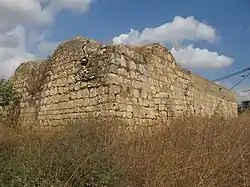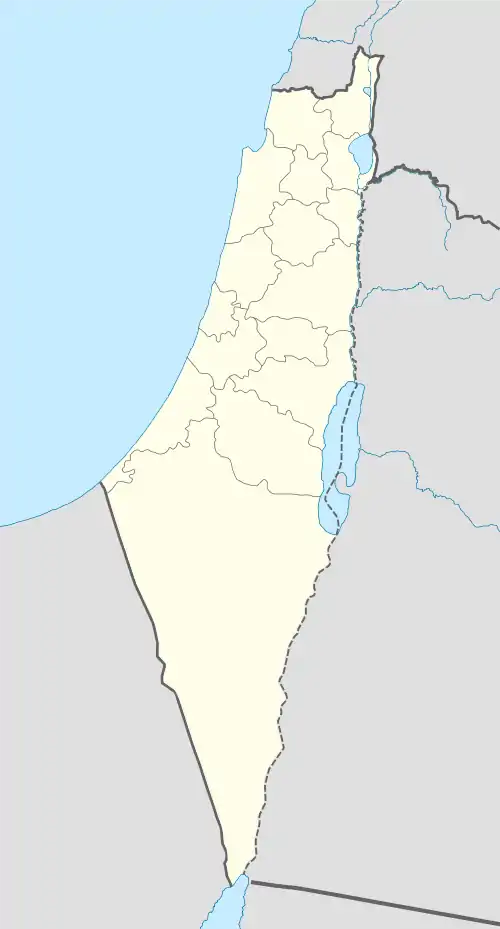Ono, Benjamin
Ono (Hebrew: אונו) was a biblical town of Benjamin in the "plain of Ono" (1 Chr. 8:12; Ezra 2:33). The modern Kiryat Ono is not to be confused with the biblical Ono.
אונו | |
 Standing structure of mosque | |
 Shown within Mandatory Palestine  Ono, Benjamin (Israel) | |
| Alternative name | Kafr 'Ana |
|---|---|
| Location | |
| Region | Sdot Dan |
| Coordinates | 32°01′38″N 34°52′05″E |
| History | |
| Periods | Chalcolithic period to present |
| Cultures | Canaanite, Jewish, Greco-Roman, Byzantine, Islamic, Ottoman, Israeli |
| Site notes | |
| Excavation dates | 1998 |
| Archaeologists | A. Gorzalczany, R. Gophna, I. Taxel, and A. Feldstein |
| Condition | Inhabited |
History
The biblical town of Ono (1 Chronicles 8:12; Nehemiah 6:2) has been identified by most scholars with the Palestinian village, Kafr 'Ana, whereon is now built Or Yehuda,[1][2] or, more specifically, with the nearby ruin of Kafr Juna, as Kafr 'Ana actually represents a Byzantine-period expansion of a nearby and much older site –– Kafr Juna, believed to be the ancient Ono.[3] The territory of Benjamin was known to stretch from a place around Jerusalem to the plains on the west.[4][5][6] According to the Mishnah, the town of Ono was encompassed by a wall before the Israelite conquest of Canaan under Joshua.[7]
Not succeeding in their attempts to deter Nehemiah from rebuilding the walls of Jerusalem, Sanballat and Tobiah resorted to stratagem, and pretending to wish a conference with him, they invited him to meet them at Ono. Four times they made the request, and every time Nehemiah refused to come. Their objective was to take him prisoner.
Archaeology
In 2009, two separate archaeological excavations were conducted in Ono, one by Nissim Golding-Meir on behalf of the Hebrew Union College-Jewish Institute of Religion, Jerusalem,[8] and the other by Jenny Marcus on behalf of the Israel Antiquities Authority (IAA).[9]
Further reading
- Ram Gophna, Itamar Taxel & Amir Feldstein (2005). A New Identification of ancient Ono, Bulletin of the Anglo-Israel Archaeological Society, Volume 23, pp. 167–176
References
- Khalidi, W., All that Remains, Washington, D.C. 1992, pp. 247-248; Carta's Official Guide to Israel, Jerusalem 1983, p. 358; Conder and Kitchener, SWP II, London 1881 p. 251; Ishtori Haparchi, Kaphtor u'ferach (ed. Avraham Yosef Havatzelet), vol. II (third edition), chapter 11, s.v. מלוד לאונו, Jerusalem 2007, p. 75 (note 265), who cites Mishna Arakhin 9:6 as proof of antiquity (Hebrew).
- Samuel Klein, Judaea: from the Return of the Babylonian Exiles to the Redaction of the Talmud ( ארץ יהודה: מימי העליה מבבל עד חתימת התלמוד), Devir: Tel-Aviv 1939, s.v. אונו (Hebrew)
- See p. 175 in: Taxel, Itamar (May 2013). "Rural Settlement Processes in Central Palestine, ca. 640–800 c.e.: The Ramla-Yavneh Region as a Case Study". Bulletin of the American Schools of Oriental Research. 369 (369): 157–199. doi:10.5615/bullamerschoorie.369.0157. JSTOR 10.5615/bullamerschoorie.369.0157. S2CID 163507411.
- Ishtori Haparchi, Kaphtor u'ferach (ed. Avraham Yosef Havatzelet), vol. II (third edition), chapter 11, s.v. מלוד לאונו, Jerusalem 2007, p. 75 (note 265)(Hebrew). Kafr 'Ana actually represents a Byzantine-period expansion of a nearby and much older site –– Kafr Juna, believed to be the ancient Ono.
- Page 19 in: Maisler, Benjamin (1932). "A Memo of the National Committee to the Government of the Land of Israel on the Method of Spelling Transliterated Geographical and Personal Names, plus Two Lists of Geographical Names". Lĕšonénu: A Journal for the Study of the Hebrew Language and Cognate Subjects (in Hebrew). 4 (3): 1–92. JSTOR 24384308.
- Babylonian Talmud, Megillah 4a
- The Mishnah, (ed.) Herbert Danby, Arakhin 9:6 (p. 553 - note 14)
- Israel Antiquities Authority, Excavators and Excavations Permit for Year 2009, Survey Permit # B-342
- Israel Antiquities Authority, Excavators and Excavations Permit for Year 2009, Survey Permit # A-5710
Sources
![]() This article incorporates text from a publication now in the public domain: Easton, Matthew George (1897). "Ono". Easton's Bible Dictionary (New and revised ed.). T. Nelson and Sons.
This article incorporates text from a publication now in the public domain: Easton, Matthew George (1897). "Ono". Easton's Bible Dictionary (New and revised ed.). T. Nelson and Sons.